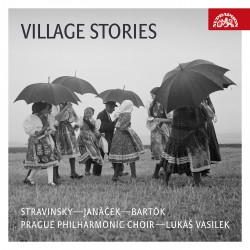 Stravinsky, Janáček, Bartók: Village Stories
Stravinsky, Janáček, Bartók: Village Stories
Prague Philharmonic Choir; Lukáš Vasilek
Supraphon SU4333-2 (supraphon.com/album/763075-stravinsky-janacek-bartok-village-stories)
Village Stories brings together the worlds of ethnomusicology and nationalism in one compelling package. The featured composers were all profoundly influenced by their interest in indigenous musical materials to varying degrees. Bartók roamed far and wide scientifically recording and transcribing source materials on Edison cylinders; Janáček did much the same, though more modestly, while also probing deeply into the melodies concealed in everyday human speech. Stravinsky took a more leisurely approach, shamelessly stealing his materials from pre-existing publications. (The eerie opening bassoon solo of his Rite of Spring, for example, is cribbed from a volume of Lithuanian folk songs.)
The apogee of Stravinsky’s magpie-mania culminated in his explosive and highly influential ballet Les Noces (The Wedding) for chorus, four pianos and percussion ensemble, completed after many false starts in 1923.
Janáček’s whimsical Říkadla (Nursery Rhymes, 1926) is a late work based on humorous doggerel culled from the funny pages of his daily newspaper. Scored for ten instruments (including a toy drum and an ocarina!) and a small choir, it is a patently absurd and highly enjoyable treasure trove of good clean fun. He considered these Czech verses as “frolicsome, witty, cheerful – that’s what I like about them. They’re rhymes after all!” This delightful set of 18 choral miniatures is guaranteed to put a smile on your face.
Bartók’s Three Village Scenes, also composed in 1926, is scored for female choir and chamber orchestra. It is considered by some to be his response to Stravinsky’s Les Noces, but with a twist. The opening movement likewise depicts a wedding scene, though the agitated, asymmetric orchestral outbursts and minor key setting hint at a dim future; a line of the text reads, “I’m a rose, a rose, but only when I’m single. When I have a husband, Petals drop and shrivel.” The subsequent Lullaby touchingly laments an uncertain future for a mother’s child. A rollicking Lad’s Dance concludes the work on a more positive note.
Full English translations of the Russian, Czech and Hungarian texts are included with the physical product; unusually, the Stravinsky libretto is also provided in the Cyrillic alphabet. The perfoóóórmances are uniformly excellent and the audio production first class. Not to be missed.



